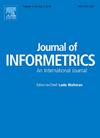Do OpenCitations and Dimensions serve as an alternative to Web of Science for calculating disruption indexes?
IF 3.5
2区 管理学
Q2 COMPUTER SCIENCE, INTERDISCIPLINARY APPLICATIONS
引用次数: 0
Abstract
As open access repositories become more prevalent worldwide, scholarly interests in comparative analysis of bibliographic databases are on the rise. Despite this, there is a remarkable scarcity of empirical studies evaluating the efficacy of open and restricted access databases as viable alternatives to traditional closed access models. This study employs the Disruption Index (DI) to analyze three bibliographic databases (WoS, Dimensions, and OpenCitations) across four research fields: Synthetic Biology, Astronomy & Astrophysics as established fields, and Blockchain-based Information System Management and Socio-Economic Impacts of Biological Invasions as emerging ones. After extensive experiments, three main findings are observed as follows. (1) The articles with higher citation counts typically exhibit higher DI values across all fields. (2) The WoS and Dimensions consistently demonstrate closer alignment across established and emerging fields. More missing citations in the OpenCitations lead to significant deviations from the WoS in term of DI values. (3) Compared to the OpenCitations, the Dimensions emerges as a superior alternative to the WoS to some extent.
openencitations and Dimensions是否可以替代Web of Science来计算中断指数?
随着开放存取资源库在世界范围内的普及,对书目数据库比较分析的学术兴趣正在上升。尽管如此,评估开放和限制访问数据库作为传统封闭访问模型的可行替代方案的有效性的实证研究非常缺乏。本研究采用干扰指数(DI)分析三个书目数据库(WoS、Dimensions和OpenCitations),涵盖四个研究领域:合成生物学、天文学和天文学;天体物理学是已建立的领域,基于区块链的信息系统管理和生物入侵的社会经济影响是新兴领域。经过大量的实验,主要发现如下三点。(1)在所有领域中,被引频次高的文章通常表现出更高的DI值。(2) WoS和Dimensions在已有领域和新兴领域始终表现出更紧密的一致性。开放引文中缺失的引文较多,导致DI值与WoS存在较大偏差。(3)与开放引文相比,维度在某种程度上优于WoS。
本文章由计算机程序翻译,如有差异,请以英文原文为准。
求助全文
约1分钟内获得全文
求助全文
来源期刊

Journal of Informetrics
Social Sciences-Library and Information Sciences
CiteScore
6.40
自引率
16.20%
发文量
95
期刊介绍:
Journal of Informetrics (JOI) publishes rigorous high-quality research on quantitative aspects of information science. The main focus of the journal is on topics in bibliometrics, scientometrics, webometrics, patentometrics, altmetrics and research evaluation. Contributions studying informetric problems using methods from other quantitative fields, such as mathematics, statistics, computer science, economics and econometrics, and network science, are especially encouraged. JOI publishes both theoretical and empirical work. In general, case studies, for instance a bibliometric analysis focusing on a specific research field or a specific country, are not considered suitable for publication in JOI, unless they contain innovative methodological elements.
 求助内容:
求助内容: 应助结果提醒方式:
应助结果提醒方式:


